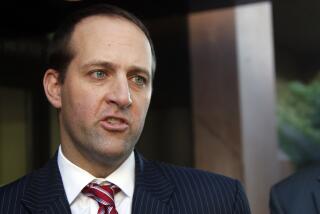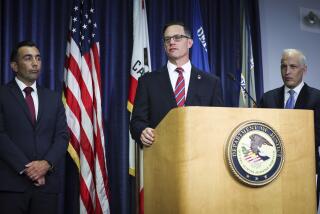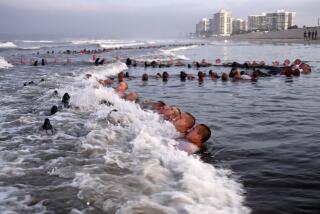Linked to Scandal by Navy ‘Zealots,’ Ex-Admiral Says
- Share via
WASHINGTON — Retired Adm. James A. (Ace) Lyons Jr. said Friday his name became linked to the Pentagon bribery and fraud scandal because top Navy officials approved a consulting contract for him with McDonnell Douglas Corp. last December at a time when they knew the FBI’s secret investigation was under way.
Lyons, in an interview with The Times, accused federal investigators and a group of “vindictive zealots” inside the Pentagon of conducting a smear campaign against him and former Navy Secretary John F. Lehman Jr. by including his name in a search warrant and leaking information to the press.
“We’ve got a very vindictive clique who wants to destroy Lehman and me, certainly with Lehman being the real target,” said Lyons, who was promoted by Lehman to four-star admiral and commander in chief of the Pacific Fleet. Lyons was forced to resign last fall by Lehman’s successor, former Navy Secretary James H. Webb Jr.
Lyons, 61, whose relations with many of his fellow commanders were marred by what they considered his bluntly authoritarian leadership style, said that many of the Navy’s top uniformed officers are now bashing Lehman because they fear he might return to the Pentagon as secretary of defense if Vice President George Bush is elected President.
Neither Lehman nor Lyons is a target of the investigation, officials say. But Lyons’ name appears on a search warrant served at McDonnell Douglas offices in St. Louis. The warrant said investigators were seeking a wide range of documents “relating to the work of Ace Lyons” on selling F-18 aircraft to South Korea.
Lyons said he would not have gone to work for McDonnell Douglas in February if Pentagon officials, who had known of the investigation for several months, had advised him not to accept the consulting contract. Instead, Lyons said, the company was given a go-ahead to hire Lyons in December and written approval in April.
A Navy spokesman confirmed that Lyons was cleared to engage in consulting work for McDonnell Douglas.
Although Lyons offered no direct evidence that Navy officials intentionally lured him into the scandal, he said he knows from former colleagues that Pentagon officials, including Webb and several top admirals, knew about the scandal in advance.
Sees Political Motives
“I’m not associated with this other crap,” Lyons said, referring to allegations that defense consultants have used classified information to help companies win contracts. “So, why in the hell was I even brought into that other than to discredit me . . . . I have a few vindictive zealots who have chosen to drag me into this . . . damn thing for purely political purposes.
“I’m there by innuendo. The salivating (among Navy officials who knew that Lyons was about to join McDonnell Douglas) must have been too much for the system,” he said.
When asked about Lyons’ assertions that he and Lehman are linked to the investigation because of political motives, Justice Department chief spokesman Patrick S. Korten said, “That’s an odd combination of ignorance and megalomania.”
Webb said Lyons’ comments were “absolutely ridiculous.” Webb, the only Navy official who has acknowledged receiving periodic updates about the investigation before the scandal became public, said he did not know about Lyons’ consulting work until he read about it in newspapers recently.
Webb said he was briefed on three occasions by Rear Adm. John E. (Ted) Gordon, commander of the Naval Investigative Service.
Was Told Few Details
Webb said he was told last fall that Lehman’s close friend and former assistant Navy secretary, Melvyn R. Paisley, was at the center of the scandal but did not learn the names of any companies or individuals under investigation.
“There are people who don’t like Lehman, people who don’t like me,” Webb said. “That is the name of the game when you go into government. If people are using this against Lehman, it has nothing to do with me. I am trying to make a living writing books. I have no desire to get back into the Department of Defense.”
Lyons said also that Adm. Huntington Hardisty, the vice chief of naval operations, had been aware of the investigation. But Cmdr. Mark Baker, a Navy spokesman, denied that Hardisty had any knowledge of the investigation before it was made public.
Critical of Reports
Lyons was critical of published reports that have linked him socially and professionally with Paisley, the highest-ranking former Pentagon official implicated in the scandal. Lyons said he does not know whether Paisley asked McDonnell Douglas to hire him as a consultant, as has been widely reported in the press.
The search warrant served on McDonnell Douglas, a Paisley client, alleged that when Paisley was in the Pentagon he steered a major Navy aircraft program to McDonnell Douglas, funneled confidential bidding documents to the aircraft firm and used his influence to help the company in an ongoing competition to sell the F-18 fighter to South Korea.
“I don’t know a . . . thing about what Mel Paisley has done,” Lyons said. “Mel Paisley is a friend. No more, no less.”
Lyons said that McDonnell Douglas executives offered him a consulting contract in December and in February to promote the company’s F-18 aircraft to South Korean officials. After initially rejecting the proposal in December because it would involve too much travel, Lyons said, he accepted a “scaled down” offer in February.
He refused to disclose his fee or identify several other companies that have hired him as a consultant.
As chief commander of the U.S. Pacific Fleet, Lyons exercised overall operational control over U.S. naval forces in South Korea. He frequently met with foreign officials in the Far East and was intimately familiar with the carrier-based F-18, sources said.
He said his consulting assignment was to convince the Korean government that it needed an all-weather night fighter-attack aircraft such as the F-18.
“I try to explain to the Koreans what their requirements are versus the (Soviet) threat . . . and how it all fits into their overall deterrence equation,” Lyons said. “But I’m not there as a bagman.”
In an hourlong telephone interview, Lyons said that he and aides had stopped in St. Louis twice last year to visit McDonnell Douglas headquarters before he retired from the Navy last fall. Lyons said that both visits involved official Navy business and that he did not speak to anyone in the company’s marketing department during the visits.
The first trip, in January, became necessary when Lyons grounded the fleet’s F-18 aircraft because of landing problems, he said, and the second visit in March was scheduled to monitor the production of highly classified so-called “black programs.”
Lyons, who said he has never held a job in military procurement programs during his colorful 39-year tenure in the Navy, appeared exasperated by the scrutiny and notoriety he has received recently.
“I’m not even sure I want to do this stuff,” he said of his consulting work.
Staff writer Ronald J. Ostrow contributed to this report.
More to Read
Sign up for Essential California
The most important California stories and recommendations in your inbox every morning.
You may occasionally receive promotional content from the Los Angeles Times.













